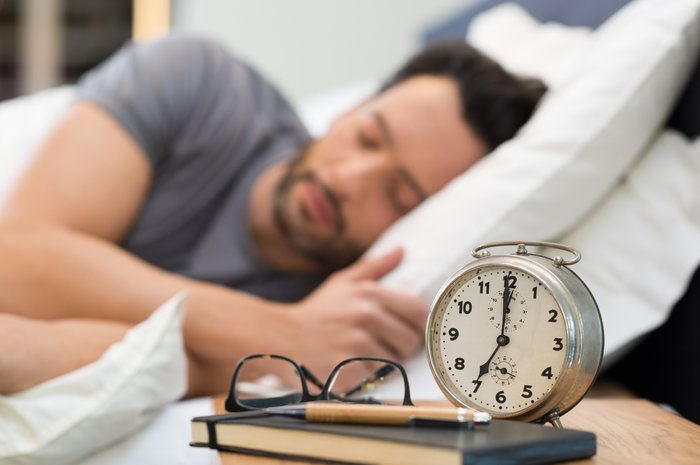
FREE E-BOOK: STRESS BUSTING RECIPES
You look up at the clock and it is past midnight – again.
You stay up for hours reading news on your smartphone.
The moment you snuggle into bed, your mind starts racing and you can’t seem to fall asleep.
Sound familiar? We all want to feel refreshed in the morning and yet, it doesn’t happen. So we fall back to drinking coffee and go about our days feeling tired and cranky. According to the CDC, one in three American adults are not getting enough sleep.
The problem with not getting enough sleep. When you are not sleeping enough, feeling tired is only a small part of the problem. Your memory and performance also suffers. Poor sleep disrupts blood pressure, blood sugar regulation, raises stress hormone levels and increases inflammation. With chronic sleep deprivation, you may face increased risks of heart disease, diabetes and obesity.
How much sleep do you need? According to the American Academy of Sleep Medicine and the Sleep Research Society, adults need over 7 hours of sleep per night. Teens need about 8-10 hours while children need about 9-12 hours of sleep per night. Only a small percentage of the population can get away with 6 or less hours of sleep and not suffer from performance issues or health consequences. The gift is in their genes – however, this is a very rare ability. The rest of us will need more sleep to feel our best.
What causes poor sleep?
You might have work or family obligations that prevent you from getting enough sleep. Some people may work late night shifts. Others may need to tend to their newborn several times a night. Still, in many cases, habits such as late-night YouTube watching or smartphone scrolling are to blame. Others have insomnia, which is a sleep disorder that makes it hard to fall asleep or causes you to wake up too early. About one of every five adults have insomnia, which often (but not always) leads to insufficient sleep.
What can you do about it?
If you aren’t getting enough sleep, here are some tips that may help.
- Reduce the amount of light exposure you have at night. Before your bedtime, dim the lights around the house or bedroom and shut down screen time. If you need to do something on your phone or computer, apply a filter or adjust settings to block blue light, which is stimulating and disrupts circadian rhythm.
- Start incorporating relaxing rituals for the evening. You may read a book or write in a journal. You may reflect on the day's events in order to “close out” of thinking about events when you are trying to fall asleep. You may also consider yoga to ease your mind and body before bed.
- Deep breathing exercises may help you unwind and relieve tension. Deep breathing is when you breathe from your abdomen rather than from your chest. This exercise also slows down your heart rate, making it easier to drift to sleep.
- Consider taking a supplement containing L-Theanine. L-Theanine is a natural amino acid found in tea leaves that promotes relaxation. One study found that taking a 200 mg supplement over 4 weeks was able to decrease sleep quality problems and stress related symptoms.1
If you enjoyed this blog, sign up to receive more articles on health and wellness topics from Sundita here. When you sign up, you'll also receive a free downloadable Stress Busting Recipes cookbook!
[1] Hidese S, Ogawa S, Ota M, et al. Effects of L-Theanine Administration on Stress-Related Symptoms and Cognitive Functions in Healthy Adults: A Randomized Controlled Trial. Nutrients. 2019;11(10):2362. Published 2019 Oct 3. doi:10.3390/nu11102362https://www.ncbi.nlm.nih.gov/pmc/articles/PMC68361...
POPULAR POST
Customer Care
*These statements have not been evaluated by the Food and Drug Administration. These products are not intended to diagnose, treat, cure, or prevent any disease.





